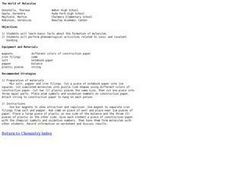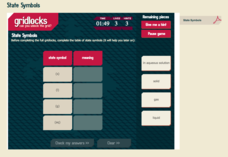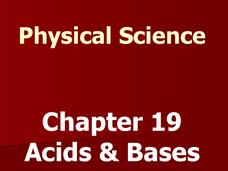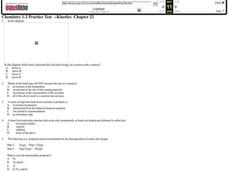Royal Society of Chemistry
Some A-level Reagents
Learning names and formulas can be a daunting task for young chemists, so support their study with interactive puzzles! First, users match each formula with its correct name. Then, individuals use them to complete three logic games.
Curated OER
The World of Molecules
Students investigate molecules through 2 demonstrations and writing formulas for molecules given the oxidation states of the atoms. In this molecules lesson plan, students observe iron filings being separated from salt and pepper using a...
Curated OER
A Little Chemistry
The molecular properties of water are the focus of this chemistry-based assignment. Multiple-choice, true-or-false, matching, and fill-in-the-chart style questions query assignees about the forces that hold the water molecule together,...
Biology Junction
Macromolecules
In chemistry, organic means something contains a carbon base. A helpful presentation starts by defining macromolecules as large organic carbon molecules. Scholars answer questions about each topic on the associated worksheet. It covers...
Royal Society of Chemistry
State Symbols
When water is a solvent in a chemical equation, we consider it an aqueous solution. Scholars match the name of four states of matter to their proper symbol in a chemical equation. Four puzzles provide repetition to help pupils remember...
Serendip
How Do Muscles Get the Energy They Need for Athletic Activity?
Every muscle movement requires energy, but where does that energy come from? Scholars answer this question and more as they complete a worksheet. By following the directions, completing research, and discussing it as a class, they begin...
Curated OER
Biochemistry Quiz
In this biochemistry worksheet, students review amino acids, proteins, lipids, and carbohydrates. This worksheet has 29 multiple choice, 8 fill in the blank, and 3 short answer questions.
Curated OER
Naming Binary Covalent Compounds
In this compounds instructional activity, students read how to name binary covalent compounds and then practice by naming 10 binary covalent compounds.
Curated OER
Batteries
In this battery worksheet, students answer 14 questions about primary cell batteries, secondary cell batteries, and how batteries are charged. They calculate the rates of discharge for given batteries.
Mr. E. Science
Acids, Bases and Solutions
If you are not part of the solution, then you are part of the precipitate. The presentation covers solutions, suspensions, solubility, dissociation, and acid/base reactions. This is the 19th lesson in a series of 26.
Curated OER
Interpreting Chemical Formulas
In this chemical formulas activity, students practice naming molecular compounds by their formulas and determine if a gas is a compound or an element. This activity has 13 fill in the blank questions.
Curated OER
Oxidation/Reduction Reactions
In this chemical reactions worksheet, students review the oxidation number rules and then assign oxidation numbers to atoms in given compounds. Students identify the reducing agent and the oxidizing agent in reactions. Students practice...
Cornell University
Fibers, Dyes, and the Environment
Nanofibers can be made through electrospinning or force spinning in order to reduce the negative impact on the environment. Pupils study the role of fibers and dye on the environment through a series of five hands-on activities. Then,...
Curated OER
Kinetics
In this kinetics worksheet, students review activation energy, rate of reaction, and reaction mechanisms. This worksheet has 13 multiple choice questions.
Curated OER
Organic Chemistry I: Problem Set 17-alkenes
In this organic chemistry of alkenes worksheet, students name and write the chemical formulas for 12 alkenes and then complete 3 short answer questions about the saturation of alkene compounds.
Curated OER
Formulas
There are two sheets here, with 100 problems total. The first half is a list of compounds, and your young chemists should write the chemical formula for each. The next fifty give the formula and the name is required. You could also use...
Curated OER
Comparing Covalent and Ionic Substances
In this covalent and ionic substances worksheet, students use the internet to find information about the characteristics of covalent and ionic substance and explain what causes the differences in these types of substances.
Curated OER
Cell Energy Study Guide
For this cell energy worksheet, students answer questions about the processes of photosynthesis and cellular respiration. They compare the two using a Venn diagram.
Curated OER
Energy in a Cell
In this cell energy instructional activity, students are given clues about the light capturing process in plants and the energy producing reactions in animals to complete a crossword puzzle.
Curated OER
Conservation of Energy
In this energy learning exercise, students read about the Law of Conservation of Energy and compare the 6 forms of energy. Then students complete 20 matching, 2 short answer, and 6 word problems.
Curated OER
What is Matter?
Students investigate what matter is and how it changes states. In this physical properties lesson, students examine the vocabulary database and identify the characteristics of the three phases of matter. Students perform a liquid vs....
Curated OER
IPC Chemistry Review
In this chemistry review activity, high schoolers classify and name compounds, calculate atomic mass, draw Lewis Dot Diagrams, and determine number of protons for atoms. This activity has 37 fill in the blank, 38 matching, and 3 short...
Curated OER
Analyzing Oxidation-Reduction Reactions
For this oxidation-reduction reactions worksheet, students read about reactions where elements gain and lose electrons. When elements gain electrons they are reduced and when the lose electrons the elements are oxidized. They are given...
Curated OER
Periods and Groups; Valence Electrons; Masses
In this elements worksheet, students read how the elements are organized in periods and groups in the periodic table. Students use the periodic table to find the valence electrons and calculate molecular mass. This worksheet has 20 fill...

























